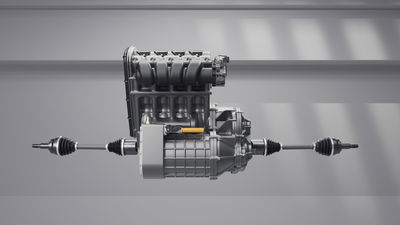The Tesla Model S Apparently Puts Out More Whole-Life Emissions Than A Petrol Supermini

Oh dear. The electric-powered Tesla Model S has been found to produce more whole-life carbon dioxide than a petrol supermini.
The Massachusetts Institute of Technology (MIT), which whom Lamborghini is working on future battery tech, studied a group of cars’ production methods, exhaust emissions, potential for recycling and any emissions produced by power plants for the quantity of electricity required, if any.

While the researchers say that emissions from distant power plants are the lesser of two evils when it comes to city centres, the Model S was responsible for 226g/km of CO2 during its lifetime compared to just 192g/km for the humble Mitsubishi Mirage supermini.
Admittedly, we know which one of the two we’d rather put on our driveways, but 34g/km is a significant difference. It’s fresh evidence to back the theory that electric cars are actually no cleaner overall than small petrol ones, although we’d like to see a fairer-looking comparison between, say, a Nissan Leaf and a Volkswagen Golf.

Against a more comparable car, the BMW 750 xDrive, the Model S was reportedly some 159g/km better for the planet over its entire several hundred thousand kilometre lifetime.
It also matters how the Model S in the study gets its energy. In the American Midwest, it may be coal-fired power stations. Parts of northern Europe, for example, are now heavily supplied by renewables. The argument will rumble on…
Source: Auto Express













Comments
The problem is that you are comparing a 700hp+ car with hardly 60hp car !
So the difference is pretty much expected .
Though it may decrease with using renewable sources of energy.
It clearly stated the car was 150 kg less poluting over it’s lifetime than comprable bmw. Not to mention as we move away from coal power plants it will only get better while the gas engine will always polute the environment.
Matt Kimberly is the author who posted this article. He copied parts of the original article, which, as stated at the bottom of the page, is from Auto Express. Click on “Auto Express” and you can read the original article in its entirety.
In the original article, conveniently omitted by Matt Kimberly, it says, “It should also be noted the Model S’ emissions are based on it being located in the US Midwest, meaning its use emissions are tied to the CO2-intensive ways in which electricity is produced there. Professor Trancik cautioned that “if we consider the US average electricity mix, the CO2 emissions intensity of the Tesla Model S is significantly lower than that of the Mirage.”
The whole point of electricity is that it is more renewable energy that can be created in multiple forms like solar or hydro electric generators that are less impacting to the environment making the argument against electric cars bad for the environment. California is one of the main contributors of this in the states were Tesla’s are mainly sold and manufactured so it makes more sense then you think.
So a Tesla is worse than a car I would refuse, even as a rental for just a day? Kind of not a factor to me.
Yeah but whos going to put several hundred thousand kilometers on a tesla or a 7 series? Id like to see a revised study with more reasonable parameters.
“Which whom”, Matt Kimberley?
Electric “car people” vs actual car people right now.
Did you read the article from Auto Express?
In this race for so called “electric non polluting cars” does anyone thinks how polluting is the process of making the batteries?
Pollution involved in the extracting, transporting, refining, and storing oil. It’s not exactly a “clean” or energy efficient process.
Kindly give assumptions on power production emission, life cycle assumption (EV lasts 5 years or 20 years). With shale oil we all seem to forget that oil is a finite resource. EV is not just an environmental solution but also attempt to use renewable energy (Solar, wind, Hydel) for transportation.
We must realise that for air and sea (except nuclear) travel the energy source will remain oil besides plastics etc. Oil usage has to fall soon (2025-30 latest) and not 2050 or later. EV/fuel cell is as much an energy solution as trying to be environment friendly.
Pagination